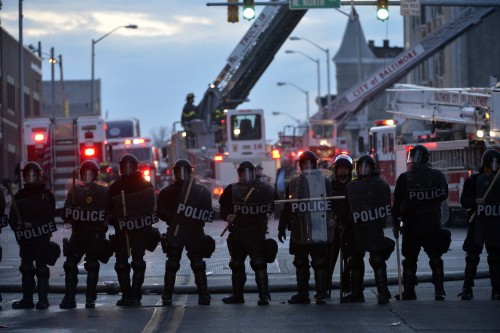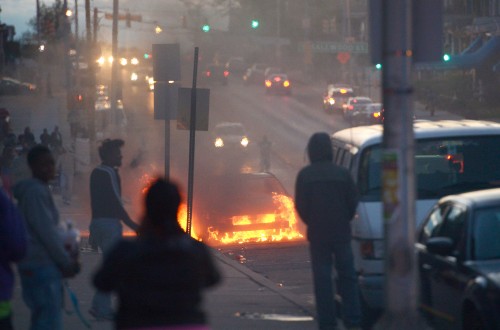
By Arun Kumar
US President Barack Obama has called for some “soul-searching” and Hillary Clinton described it as “a tragedy that demands answers”, but what happened in Baltimore in the aftermath of a black man’s death points to a much larger problem.
Monday’s eruption in Baltimore, less than an hour’s drive from the American capital, nine days after peaceful protests over the death of 25-year-old Freddie Gray in police custody a week after his April 12 arrest, goes beyond simply black and white.
The unrest in Baltimore followed a spate of protests across the country over the deaths of black men at the hands of police.
The influential Time magazine recently listed 14 major instances of a white policeman shooting dead a black person since 17-year-old Trayvon Martin was fatally shot on February 26, 2012 in Sanford, Florida.
But according to a Wikipedia compilation, as many as 157 people – of all colours and races – have been killed by law enforcement officers this year alone, with or without justification.
The Killed By Police Facebook page puts the number of people killed by US police this year at 381 and 1,101 in 2014, with a total of 2,249 since it started posting news reports of officer-involved homicides starting May 1, 2013.
In December, the Washington Post fact-checked a viral claim that a black person is killed by police ‘every 28 hours’ based on an April 2013 report titled “Operation Ghetto Storm” by the Malcolm X Grassroots Movement.
The report looked at the deaths of 313 African-American men, women and children in 2012, who were killed by police officers, security guards or “vigilantes”.
“If you divide the number of hours in a year (8,760) by 313 deaths, it does come out to one death per 28 hours. But the rest of the claim is problematic,” the Post concluded.
But “among those killed in 2012, 136 people (44 percent) had no weapon on them when they died”, it said. “That negates the claim that people who were killed ‘every 28 hours’ were unarmed.”
The Post also cited an article written by the report’s author, Arlene Eisen, in September saying that the use of “every 28 hours” as a standalone figure oversimplifies the point made in her report.
It was, she was quoted as saying, intended to “prevent future extrajudicial killings of black people by those paid or sanctioned (security guards and vigilantes) by the national security state, it is important to know that these killings are a result of the perpetual war on black people”.

In an April 20 report on what it called America’s “1.5 million missing black men”, the New York Times noted that “for every 100 black women not in jail, there are only 83 black men”.
Among cities with sizable black populations, the largest single gap is in Ferguson, Missouri — which saw days of unrest and looting after the fatal shooting of Michael Brown by a police officer last August — with 40 missing black men for every 100 black women.
This gap — driven mostly by incarceration and early deaths — barely exists among whites, it said.
As Obama said at a Tuesday press conference, a lot of the tension between law enforcement and the black community stems from “a slow-rolling crisis” that has been brewing for decades.
“Fixing it will require more investment in cities, criminal justice reform, better funding for education and soul-searching for some police departments,” he said hitting the nail on the head.